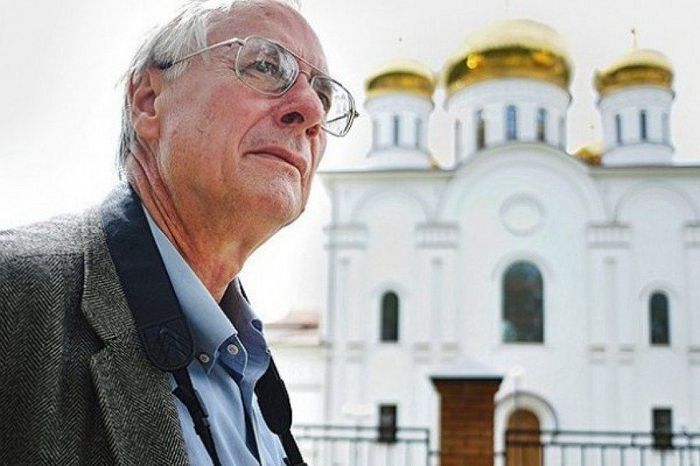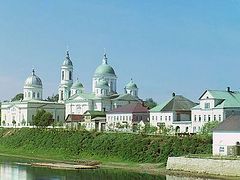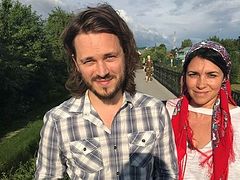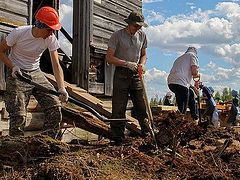Slavic Studies professor at Tulane University in New Orleans, photographer and historian William Craft Brumfield talks about the secrets of his love for Russia: “These “secrets” are not so secret, you simply have to know how to think and love.” William dedicated a half a century to this knowledge—beginning from 1970 Brumfield has travelled throughout Russia, studying its history, culture, and architecture. “But you can’t study a people,” says the professor. “You can only love a people.” The fruits of this active love and respect for the Russian people can be seen in the professor’s huge photographic work, which contains tens of thousands of images—of churches, monasteries, masterpieces of wooden architecture—preserved, restored, or destroyed—sketches from everyday life or landscapes. As many who see them say, the main thing characteristic of these works is: light. Kind, tranquil, and gentle light.
“Toy soldiers”
—My love for Russia probably began with a shock I experienced when I was an eight-year-old boy. To be more precise, no, not yet love, but my first step toward it. And I made it thanks to my wise father. Born in 1895 and having gone through the meat grinder that was the First World War (father fought in the U.S. Marines in France), he observed how I played enthusiastically with toy soldiers. As usual, it was “ours” against “theirs”. The latter were then, in the 1950s and alas, now (now in computer games), the “bad Russians”. “Ours” would knock them down by the tons—to the sound of triumphant shouts and hymns. I was totally intoxicated. Suddenly my father, very softly but so seriously that I couldn’t help but stop, asked for a couple minutes of my attention. I rose from the floor. Then he told me a something.
 Louis Floyd Brumfield, William’s father. —What could he tell you? I have always thought that Americans are not particularly concerned with other countries or peoples.
Louis Floyd Brumfield, William’s father. —What could he tell you? I have always thought that Americans are not particularly concerned with other countries or peoples.
—He told me how he had met Russian soldiers, fighters of the Expedition Corps in France. He told me what kind of people they were, how they had saved Europe, how they treated not only their allies but also their defeated enemies with compassion; about their daring and some sort of extraordinary spiritual strength. Then he told me how after the Brest peace treaty they were betrayed by those who had deprived them of their fatherland, which even lost its name, and those who had only the day before been their allies. They treated the interned Russians, in my father’s words, worse than animals. I didn’t understand much at the time, and words like “internment” didn’t say much to me, but I understood very well and strongly the meaning of my father’s conversation: First learn, and only then should you act. Father said at the time straight out: “These are our guys. They’re ours.” This shook me so much that with the years that God has given me I have tried to show the beauty—first of all the spiritual beauty, but also of course the cultural and let’s say material beauty—of Russia to the whole world. And yes I, like very many other Americans, are disturbed by today’s political miasma, the open attack on Russia and the Russian people in the Western media; but I am nonetheless convinced that the spiritual life that is in Russian will overcome this onerous, slimy lie and darkness.
 The Resurrection Church in Kargopol. 1990s. Photo: William Brumfield
The Resurrection Church in Kargopol. 1990s. Photo: William Brumfield
How to improve your vision
—What do you base this conviction upon, professor?
—Upon experience. A half a century of work in Russia, well, you know, it gives me grounds for this conviction. And there is light—that you can be sure of. Here I am very grateful to photography—by recording, let’s say, material light, it allows us to see or begin to feel the light that comes from Another Source. And this unearthly light can be seen not only on the photographs of churches, but also in the eyes, the smile, the facial expression of a person. Yes, even in the “uwazik” [a Russian-made jeep that can go almost anywhere], without which I can’t imagine any travel around Russia, and which has become very dear to me. Even in the photo of an ordinary, modest, humble, but sturdy northern horse. In all of this I see God’s Providence. Russia opened my eyes to it through photography.
 St. Nil of Stolobenny Monastery. Photo: William Brumfield, 2016.
St. Nil of Stolobenny Monastery. Photo: William Brumfield, 2016.
—Thanks greatly to you, the world learned how that old, good Russia looked, which I am afraid we have irreparably lost. You acquainted millions of people with the creative work of S. M. Prokudin-Gorsky.
—One of the goals of my endless travels around boundless Russia was to show that by far not all was lost. And there is, by the way, very much good that is new, which Sergei Mikhailovich never saw. Sometimes I repeat his routes and take pictures of those places were he worked. One can compare, take a look. But certainly there are losses. Tragic, terrible losses.
—Yes, if we take just those churches, and not the destroyed mentality, then by official statistics alone there are 4000 churches in disastrous condition or total ruin. And as we are informed from, for example, Archangelsk province, every year several old wooden churches disappear in that region alone. Old and even ancient churches.
—Well, that is another of my aims—to preserve that great antiquity in photographs.
 “Kizhi” museum and national park. Photo: William Brumfield, 1993.
“Kizhi” museum and national park. Photo: William Brumfield, 1993.
—Only to record it, and that’s all? “There was such-and-such and church there, and now there’s an empty field”?
—“That’s all” depends on you, on the viewer, the reader. I offer to his attention what was, and perhaps still is. I call upon him to admire with me that bright and gentle spiritual might, but it only depends on him whether he will put some effort into saving a church or some other building, or remain indifferent and dream of a parking lot or shopping mall on that place.
I want to show that heavenly light I see in these churches. Whether or not another person “who has eyes” (Ps. 113:13) will see it, I don’t know. I hope so, at least. One only has to see it… Russia is a bridge to this vision, according to my deepest conviction.
—In your opinion, what should a good photograph be like? And what does a person need in order to be a good photographic artist?
—A good photograph, a masterpiece, is a good mystery. Photography should captivate and astound at first sight, I think. And for this a photographer needs to have patience, perseverance, and a “uwazik”. (He laughs).
And photography is also a time machine.
 The Protection church in the village of Lyadiny, which burned down in 2013. Photo: William Brumfield.
The Protection church in the village of Lyadiny, which burned down in 2013. Photo: William Brumfield.
Transportation for travelling around Russia
—Excuse me? What kind of machine?
—A time machine! I could have been in the times of Sineus and Truvor1 as I photographed the lands of Pskov, for example. You literally feel with your skin that time, when you are there looking at the preserved masterpieces. You understand people better. So, century after century, city after city, I have come to know Russia from its western borders to Siberia; from Rurik, Alexander Nevsky, Ivan IV [the Terrible], Peter I [the Great]—basically, from its origins.
—You’ve come to know it? Although over fifty years, that’s for certain.
—Yes, with every passing year I am more and more convinced that in discovering something new you come to a door behind which there is yet more that is interesting, even great. So I haven’t so much come to know as I am coming to know. And it all began, I repeat, with a calm conversation with my father about the ability to think and love. These are useful qualities, as it turns out. We are all destined to serve something; I would want very much to serve Heaven, beauty. And I hope that I am doing that.





Sorry, but what does our intrepid reporter on the scene expect Mr B to do - personally finance and save every Russkie Church fallen into ruin and disrepair? I think it's about the Russkies sorting out that mess - and that's one thing they can't blame on the amerikans.
“I, like very many other Americans, are disturbed by today’s political miasma, the open attack on Russia and the Russian people in the Western media; but I am nonetheless convinced that the spiritual life that is in Russian will overcome this onerous, slimy lie and darkness.”
He should send it to President Trump.